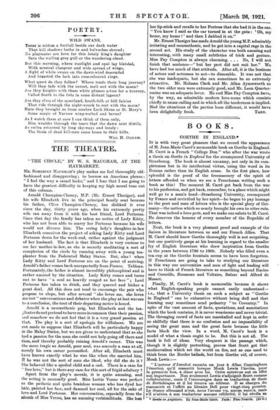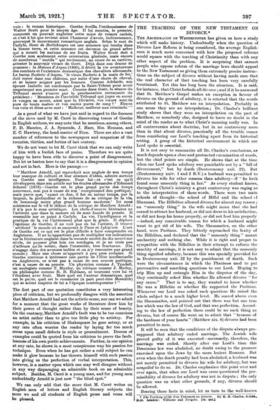BOOKS.
GOE.1.1th IN ENGLAND.•
IT is with very great pleasure that we record the appearance of M. Jean-Marie Carre's memorable book on Goethe in England. K Carre is a French " College Don " who after the war wrote a thesis on Goethe in England for the reconquered University of Strasbourg. The book is almost uncanny, not only in its com- pleteness but in its intellectual virtue, using the word in its Roman rather than its English sense. In the first place, how splendid is the proof of the freemasonry of the spirit of •
letters afforded us when we see a Frenchman writing such a book as this ! The moment M. Cane got back from the war to his profession, and got back, remember, to a place which might well go to a man's head—Strasbourg University, reconquered by France and revivified by her spirit—he began to pay homage to the poet and man of letters who is the special glory of Ger- many—the nation which so nearly brought his own to utter ruin.
That was indeed a beau geste, and we make our salute to M. Carr& He deserves the honour of every member of the Republic of
letters.
Next, the book is a very pleasant proof and example of the liaison in literature between us and our French Allies. That
K Carre should know Goethe thoroughly well is not surprising, but one positively gasps at his learning in regard to the smaller fry of English literature who drew inspiration from Goethe in the years between 1780 to 1900. Nobody who filled even a tea-cup at the Goethe fountain seems to have been forgotten.
If Frenchmen are going to take to studying our literature in this way our universities and men of light and leading will have to think of French literature as something beyond Racine and Corneille, Rousseau and Voltaire, Balzac and Alfred de Musset.
Finally, M. Carre's book is memorable because it shows what English-speaking people cannot easily understand-
i.e., that a University thesis on such a subject as " Goethe in England " can be exhaustive without being dull and that learning may sometimes send pedantry " to Coventry." In spite of the vast amount of facts, quotations, and annotations
which the book contains, it is never wearisome and never trivial. The thronging crowd of facts are marshalled and kept in order so skilfully that there is no confusion and no impossibility of seeing the great man and the great facts because the little facts block the view. In a word, M. Cane's book is a
model of what a thesis ought to be. But this is not all. The book is full of ideas. Very eloquent is the passage which, though it is slightly perturbing, proves that Scott got that mediaevalisni which set the world on fire, not as one used to think from the Border ballads, but from Goethe via, of course,
Monk Lewis :—
" L'auteur d'ivanhoe raconta un jour & Allan Cunningham remotion ressentit lorsque Monk Lewis l'invita, pour la premiere foie, A diner avec lui. Cette entrevue eut en effet son importance. Non aeulement Lewis s'adjoignit Scott comma collaborateur, mais it l'encouragea dans sa traduction de Goetz de Berliehingen et it lui trouva un editeur. 11 se ohargea du manuscrit et l'offrit an libraire Bell pour vingt-oinq guineal. Le drama allemand n'eut, nous l'avons vu, aucrm sucecs, mats s'il n'attira A son traducteur aucune celdbrite, it lui revela sa • Goedte en AltederIV. By Jean-Marie Cant. Paris : Pion-•1enrziO. [15 fr.] voie : le roman hiatorique. Goethe eveillal'enthoueiasme de Walter Scott pour le moyen age. II lui montra, le premier, comment on pouvait exploiter cette mine de tresors caches, et c'est a lui que revient &nisi l'honneur d'avoir, indirectement, provoqud le mouvement romantique anglais. Solon le mot de Carlyle, Goetz de Berlichingen eat une sentence qui tombs dans In bonne terre, et cette semenoe est devenue un grand arbre qui a nourri les nations de sea fruits. Walter Scott doit Goethe non seulement cette orientation generale, mais encore de nombreux " motifs " qui reviennent, au mute de sa earriere, attester le souvenir vivace de Goetz. Deja dans son drame de jeunesse : in Moison d'Aspen (1800), il decrit la vie aventureuse des combats at l'existenoe domestique dee chevaliers allemande. Le baron Roderic d'Aspen, ` le vieux Roderic a, la main de fer,' doit rester dans son chateau, par suite d'une chute de cheval, at se laisser soigner par lea femmes. Comma Adelaide, son 'Spouse Isabelle eat condamnee par la Saint-Vehme pour avoir empoison.ne son premier marl. Comma dana Goetz, in seance du Tribunal secret s'ouvre parla proclamation menacante du president : Membree de l'invisible Tribunal qui jugez on secret at vengez en secret, ainsi que in Divinite, vos cceurs soot-ils pure do touts malice et vos mains puree de sang t ' Eleyez vos voix et Bites avec moi : ' Malheur, malheur mix criminels.' " As a proof of what we have just said in regard to the fineness of the sieve used by K Cane in discovering traces of Goethe in English authors, we may note that he mentions, among others, F. D. Maurice, J. A. Symonds, J. Hare, Mrs. Hemans, and E. C. Hawtrey, the head-master of Eton. There are also a vast number of references to the newspapers and magazines of the twenties, thirties, and forties of last century.
We do not want to let M. earth think that we can only write of him with a foolish face of praise. Therefore we are quite happy to have been able to discover a point of disagreement. But let us hasten here to say that it is a disagreement in opinion and not in fact. Here is the passage :- "Matthew Arnold, qui reprochait aux anglais de son temps leur marque de culture et leur absence d'idees, admire surtout en Goethe une intelligence. Pour lui—et c'est ce qu'il developpera clans son article sur les etudes allemandes d'Edmond Scherer (1878)—Goethe est le plus grand poRm des temps nouveaux, non pas a cause de son exceptionnel don poetique, mais parce que, ayant ce don, il fut en meme temps, par In largeur, In profondeur et la richesse de sa critique de in vie, de beaucoup notre plus grand homme modems.' Ici nous saisissona sur le vif le &lout de la critique de Matthew Arnold : it n'a pas le sens artistique. Les chefs-d'oeuvre litteraires ne l'attirent que dans in meaure oh ils stint lourda de pensee. Il ressenable stir ce point it Carlyle. La vie, l'intelligence at In pratique de In vie l'interessent plus que In genie. Il deplore l'egoisme de Goethe, il ne voit pas en lui l'artiste, it trouve ' artificial ' le monde oh se meuvent is Tease at 1phiginie. L'art de Goethe est ce qui eat le plug difficile a faire comprendre en Angleterre. II ne m'appartient pas de multiplier ces indications sur la littorature anglaise dans in seconde moitie du dix-neuvieme siècle, de pousser .plus loin ces sondages, et je ne crois s d'ailleurs qu'ile Gwent, dans l'elasemble, tree fructueux. (paOn s'engage dans des avenues isolees et on n'y rencontre pas grand monde.) Maio tine chose m'apparatt it peu pros certaine. Si Goethe continue it interesser une pantie de l'elite intellectuelle en Angleterre, ce n'est pas a cause de son oeuvre poetique, c'est a cause de sa pensee. Un physicien comma J. Tyndall, un zoologists comma T. Huxley, un critique comme J. Morley, un philosophe comme R. B. Haldane, se tournent very lui et l'etudient avec fruit. Mais quel est l'auteur dramatique, quel eat le polte, quel est le romancier (a part pout-etre Meredith) qui se soient inspires de lui a l'epoque contemporaine Y " The first part of our quotation constitutes a very interesting piece of criticism, but we profoundly disagree with the assertion that Matthew Arnold had not the artistic sense, nor can we admit for a moment that the great works of literature drew him by their power of thought rather than by their sense of beauty. On the contrary, Matthew Arnold's fault was to be too conscious an artist rather than to give .too little play to artistry. For example, in his criticism of Shakespeare he goes astray, or at any rate often worries the reader by laying far too much stress upon small defects in style or presentiment. Dozens of examples could be quoted from his criticism to prove the fault- lessness of his own poetic achievements. Further, in our opinion at any rate, he shows in a most conspicuous way his passion for technique. Even when he has got rather a cold subject he can make it glow because he has thrown himself with such passion into giving us the perfection of verbal interpretation. This, however, is a matter upon which one may well disagree without in any way disparaging an admirable book on an admirable subject. Besides, M. Cane is a young man, and for young men undoubtedly Arnold is just now " the blind spot."
We can only add that the more that M. Cane writes on English men of letters and English literary subjects the more we and all students of English prose and verse will be pleased.



































 Previous page
Previous page